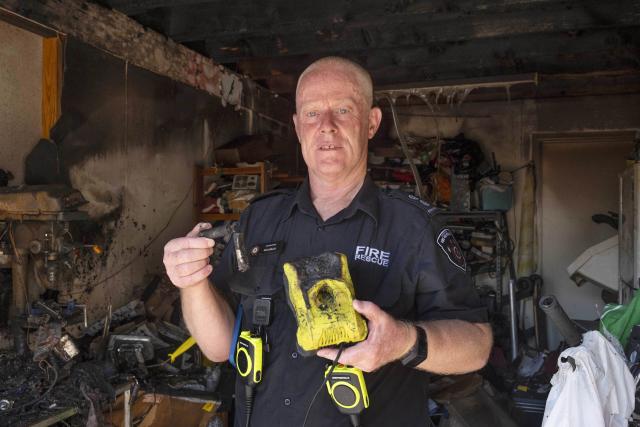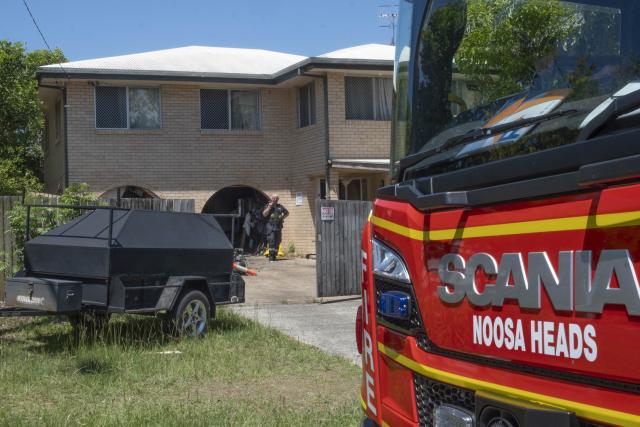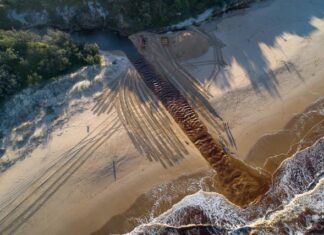An explosion in a power tool battery and charger started a fire in the garage of a Sunshine Beach house about 10am last Friday, leaving a mother and her three sons looking for a place to stay over the New Year long weekend.
Luckily the fire was contained to the downstairs garage of the two-storey building thanks to the quick action of a neighbour who dialled Triple 0 on seeing smoke emanating from the garage and the rapid response of Queensland Fire and Emergency Service officers who were on the scene within minutes of the call.
“I was upstairs and my youngest was in the lounge playing games, as kids do,“ the mother said.
“I heard a pop. I thought he was just getting toys from the upstairs room. The smoke alarm went off. I thought he might have burnt some toast.
“I went to investigate, turned the alarm off, couldn’t see anything.“
The fire alarm started again so the mother, who was home with one of her sons at the time, investigated further. She saw some smoke outside but thought it might be coming from a neighbour’s hangi.
“Sometimes our neighbours have hangis,“ she said
“I came to the door and saw smoke at the front and thought that’s a bit weird but still thought it might be from a hangi next door.
“I didn’t smell anything. It was just the fire alarm going off.“
The woman said her neighbour rushed over from across the road and she went to check the downstairs area.
When she saw more smoke she thought we’ve got to get out, she said.
The mother and son exited the building and firefighters arrived to find “smoke issuing out of the garage doors“.
Noosa station officer Kyle Dellit said on arrival firefighters entered the house with breathing apparatus.
“We confirmed there was no one in the house,“ he said. “We cut a V-shape in the left garage. We had more smoke.
“We cut it on the right and had active flame coming out.“
Officer Dellit said the firefighters fought the fire for about an hour and a half from the rear and front of the garage.
“We removed all material from the garage to ascertain we had no burning material,“ he said.
He said the rest of the house contained a strong smelling odour but otherwise appeared relatively undamaged.
QFES attended the blaze in force with two fire units from Noosa, two units from Coolum, one from Tewantin, a specialist vehicle from Caloundra which came to do air sampling and monitoring and an area commander from Maroochydore. “It’s a big resource when it happens,“ he said.
The mother’s advice to others after the fire was to “keep a check on your batteries and your fire alarms“.
“We’ve never had any problems before. I’ve never had a garden tool go off with a battery and we’re very careful of what we do,“ she said.
In October 2023 the Australian Competition and Consumer Commission (ACCC) issued a warning to consumers about rare but serious fire hazards from lithium-ion batteries, asking consumers to “choose, check, use and dispose of the batteries safely“.
Rechargeable lithium-ion batteries are contained in common household items, including most mobile phones, laptops, tablets, e-scooters, e-bikes and power tools.
“Whilst incidents are rare, they appear to be increasing and are serious when they occur. The batteries can overheat or explode if they are used, charged or disposed of incorrectly or if they are damaged, and fires caused by the batteries can be dangerous and difficult to extinguish,“ an ACCC spokesperson said.
“We are concerned by increasing reports of lithium-ion battery fires resulting in property damage and serious injuries, including burns, chemical exposure and smoke inhalation,” ACCC Deputy Chair Catriona Lowe said.
QFES advises people to know the risks of lithium-ion batteries.
“When damaged, exposed to heat sources or charged inappropriately, batteries could catch fire or, in extreme cases, explode,“ QFES advises.
“Continuing to charge after the battery is full can increase the risk of the battery catching fire.
“When overheated or on fire, lithium-ion batteries can create a highly toxic vapour cloud.
“These fires are hard to put out with water or a fire extinguisher. Re-ignition is likely to happen – even if the fire seems to be extinguished.“









